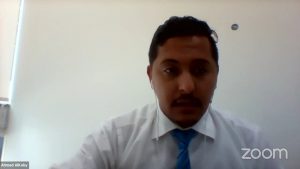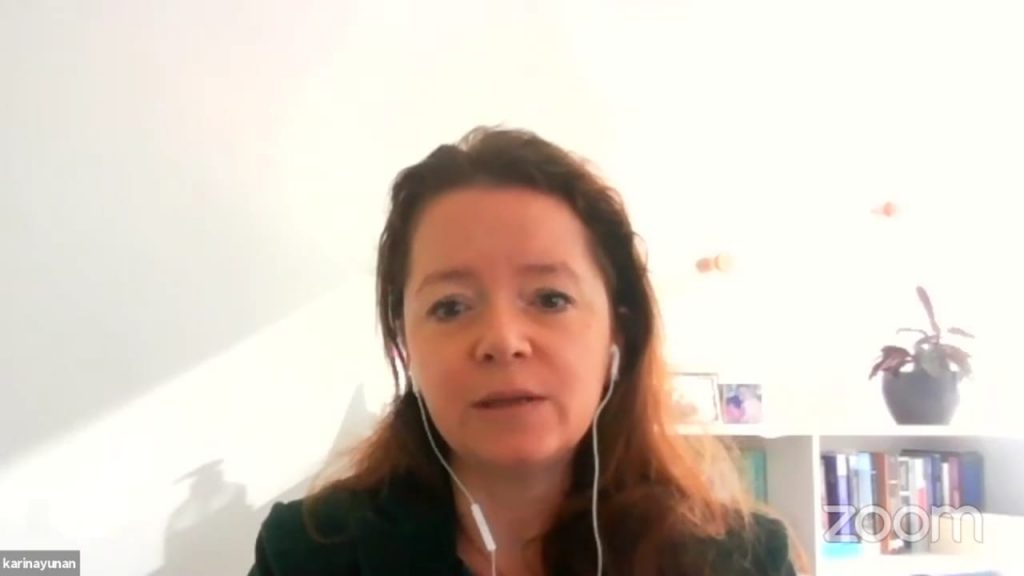São Paulo – Due diligence – a set of analyses designed to assess the risks in a deal – must be employed in deals of any size, Brazilian and Arab specialists argued this Wednesday (8) during the webinar “Safety in Exports: Due Diligence and Banking Safety,” hosted by the Arab Brazilian Chamber of Commerce (ABCC).
Law firm Souto Correa Advogados’s corporate law partner Karina Yunan Saad (pictured above) said figuring out legal aspects is important in getting to know your trading partner. “It’s a precaution in order to build a durable relationship. It depends on the size of the deal. The bigger and more complex the deal, the more comprehensive an analysis of one’s partner is required. Smaller deals require a more generic, but no less important analysis,” explained Saad.

UAE-based law firm Al Dahbashi Gray partner Josh Kemp agrees that care is due whatever size a company is. “You must figure out who’s responsible. You must check the company’s bylaws and approval certificates. The internet is a tool to that end, and we stress the need to have someone go out to their actual office. Some companies only have virtual offices, and this can be a cause for concern,” he said.
Saad said this is where the need for legal auditing arises. By figuring out the size of one’s trading partner, one can determine what kind of demands one can make, considering aspects such as corporate law. “What is the structure [of the contracting or the contracted party]? Is it a conglomerate of several businesses, each playing a different role? What is the status of this conglomerate’s public registration?”, she inquires, regarding registration at the federal, state and local levels.

Saad explains that an international contract must specify whether it is governed by Brazilian or foreign law. Another tool when it comes to exports is the bill of lading (BL), which is issued by the exporter and serves as a receipt of delivery. It imparts added safety to the seller in case they do not get paid on the agreed-upon date. “Brazilian law considers the BL as credit instrument, a document which represents the goods being traded. The way Brazilian law treats the BL helps Arab exporters go the judicial route faster to settle a dispute, such as non-payment, for instance,” explained law firm Souto Correa Advogados dispute resolution partner Raphael Jadão.
For Josh Kemp, doing analysis early on in a deal is a way to prevent potential problems. “You must find out where the other party is based, because the conditions in that free zone or the courts might not be as good when it comes to dispute resolution,” he said, stressing the need to run credit checks, which can be done through research into Arab courts. “It’s easy to get the information and then to get it translated. Or else you can get consulting from a local attorney at a very low cost. This can save you lots of money in the long run,” he said.
ADG attorney Ahmed Alkoby explained the need to check the clauses in documents issued by both parties. “There are often a few discrepancies. This happens a lot with major international businesses. It’s like you have two contracts in two different languages, and each party will claim that theirs prevails,” he explained.

Alkoby explains that in the event of a lawsuit, the UAE have proven faster than other places. “In other jurisdictions, litigation can take as long as 2 or 3 years. This creates a lot of uncertainty. In most Arab countries, there is the option of a payment order, which is quicker and can be used to petition a judge. It’s a trade instrument that shows the need to honor a payment. It could be a cheque, a receipt or other documents that can lead to a faster outcome,” he said.
Questioned as to whether it takes long to take legal action with a bill of lading in an Arab country, AlKoby explained that in the UAE, in case the problem is payment-related and one has attestation of delivery, the process is simple. “All it takes is to notify the other party. If they fail to pay within 5 days’ time, you can sue,” he said, noting that courts can take as long as 2 weeks to look into a lawsuit.
ABCC Commercial manager Daniella Leite said the topic of the webinar was a request made by several executives. “We are constantly getting asked questions regarding safety and due diligence in exports. It was great to hear them go over the procedures,” she said. ABCC Investment director Daniel Hannun, who moderated the webinar, discussed the Chamber’s efforts to connect Arabs and Brazilians. “We ushered in our Arab membership in August last year, in a bid to create even tighter-knit relations between Brazilian and Arab enterprises,” he said.
The event featured simultaneous interpretation into Portuguese and English. Speakers also included ABCC Foreign Trade vice president Ruy Carlos Cury; National Bank of Fujairah head of Trade Services Madhavan Rajagopalan, of the UAE; and bank BS2 International Relations head Gustavo Pieratti, of Brazil. Danilo Garcia of CECIL, which exports defense industry products to governments, and Abdel Rahman, of the Al Shahed Group, gave testimonials about their experiences.
For more on the webinar check out Banks impart safety to foreign trade transactions.
You can watch the full webinar here:
Translated by Gabriel Pomerancblum




